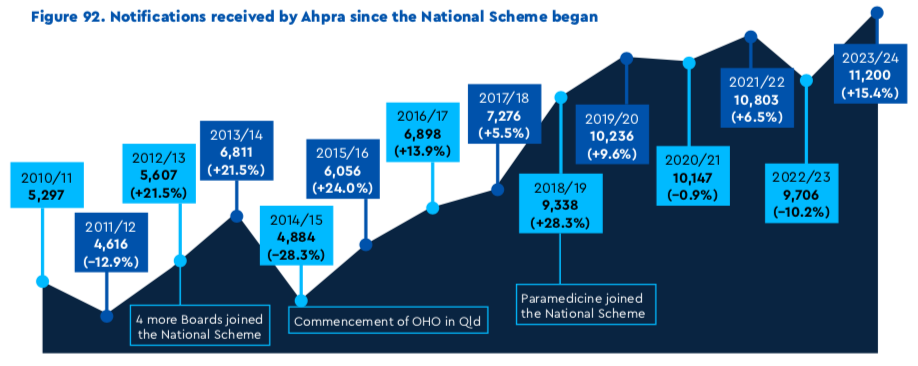Criminal complaints increased by almost 24%, with outcomes including the first ever custodial sentence under the National Law. But the news was not all bad.
Notifications to the Australian Health Practitioner Regulation Agency are at an all-time high, but the timeframe to closure is falling.
According to AHPRA’s 2023-24 annual report, released this week, there was a 23.8% increase in criminal complaints received by AHPRA in 2023-24 compared to the previous year.
Outcomes included 14 criminal prosecutions and the first ever custodial sentence under the National Law handed to someone falsely claiming registered health practitioner status.
In another landmark ruling in October, under the National Law, a tribunal disqualified a doctor for 12 months over his discriminatory, culturally unsafe, insulting and offensive behaviour towards a Yuggera, Warangoo and Wiradjuri man.
“This outcome reflects changes made in 2022 to strengthen the National Law to eliminate racism from Australian healthcare,” said AHPRA.
Overall, in 2023/24, there were 19,522 notifications made nationally about 15,078 practitioners – 1.6% of all registered health practitioners.
Notifications to AHPRA specifically increased 15.4% compared to the previous year, to 11,200 in total.

AHPRA’s outgoing CEO Martin Fletcher, who is stepping down after 15 years, said it had been an “exceptionally busy year”.
The agency was, however, able to close more notifications than any previous year – a total of 11,156 and 4.7% more than last year.
Just over 600 of the 5049 open notifications are awaiting tribunal hearing or outcome.
Of those that made it to a tribunal, 96.8% resulted in disciplinary action, with disqualifications of up to 40 years.
A total of 2% of the closed notifications resulted in loss of registration or disqualification for application for registration.
A number of the matters referred to tribunal were boundary violations, including sexual misconduct, which increased 37.5% compared to the previous financial year.
The agency pointed to a number of changes it was implementing as part of an “action plan” to improve public safety and support notifiers.
These included supporting National Law reforms to include practitioners’ past sexual misconduct on the Register of practitioners to improve transparency and ongoing review of the Criminal history registration standards.
Last year AHPRA reshuffled how it managed notifications, by triaging alerts primarily based on risk to the public. The changes were implemented as part of the regulator’s response to a report published earlier in the year outlining the toll of the regulatory complaints process on practitioners.
This included reports of 20 instances of serious self-harm or suicide by practitioners under review in four years.
According to the agency, the changes contributed to a “significant improvement” in timeframes for notification closures.
Compared to the previous financial year, 22.7% more notifications were closed within three months – 45.1% of all closed notifications – and 67.8% more notifications were closed in three to six months.
“Identifying at an early point which notifications can be dealt with through early determination has significantly improved the time it takes to close notifications,” said the agency.
“Lower risk matters before the Medical and Dental Boards of Australia were completed on average 33 days sooner than in the previous year.”
The number of notifications open for more than 12 months fell by 20.6% compared to the previous year, but this excluded those managed through a panel or tribunal.
“Many of the higher-risk notifications referred to a tribunal or panel involve complex and long-running investigations,” said AHPRA.
“They are often required to await the outcome of other legal or investigative processes such as police investigations or coronial inquiries.
“Of the notifications completed this year, 195 spent time awaiting the outcome of an external process and the average time waiting for the external processes was 344 days.
“Once a matter has been referred to a panel or tribunal, we rely in part on the timeliness of external parties, such as the tribunal itself or the practitioner’s representatives.
“Once a matter was referred, it took on average 683 days for it to be finalised by the tribunal.”
According to AHPRA’s data, both practitioner and notifier satisfaction for the notification process increased between 2022/23 and 2023/34, by five percentage points and six percentage points respectively.
Most notifications were made by patients and their friends and family (71%), with 18.7% originating from health practitioners and employers.
The number of notifications from unnamed sources – confidential or anonymous – increased 44.9% compared to the previous financial year.
The agency focused on progress in addressing workforce needs, touting the biggest increase in registered practitioners in four years – 4.9% to 920,535.
This is the first time the number of registered practitioners has exceeded 900,000.
The report said AHPRA was continuing to work to register international practitioners quickly and safely through implementation of the Kruk recommendations.
“Improvements to AHPRA’s registration processes have almost halved the time to finalise international applications, cutting the previous 60-day average to just 33 days,” said the agency.
Related
The agency also took aim at some newer models of care.
“Maintaining a balance between access to needed healthcare and the risk posed by some emerging models of care is a key priority for AHPRA, amid the acceleration of telehealth, online prescribing and direct-to-consumer health services,” read the report.
“New models of care in areas such as medicinal cannabis and vaping have led AHPRA to develop cross-regulatory solutions with other regulators, such as the Therapeutic Goods Administration, to take a system-wide approach to patient safety.
“By leading collaborative efforts to address emerging issues including high-speed and high-volume prescribing, or models of care focused on prescribing and dispensing a single medicine, AHPRA aims to get ahead of these concerns and ensure all health practitioners continue to put patients first.”





